The 10 best movies of 2023 (so far)
- Oops!Something went wrong.Please try again later.
- Oops!Something went wrong.Please try again later.
- Oops!Something went wrong.Please try again later.
- Oops!Something went wrong.Please try again later.
- Oops!Something went wrong.Please try again later.
- Oops!Something went wrong.Please try again later.
- Oops!Something went wrong.Please try again later.
When film historians look back at the pop culture of 2023, what will stick out to them? A robot who slays literally and figuratively? Nike sneakers? Gun-fu? Maybe intimate, personal stories about a mother and son, paths untaken, and teenage growing pains? EW critics Christian Holub, Devan Coggan, and Maureen Lee Lenker discuss all of that and more with the best movies of (the first half) the year.
<em>A Thousand and One</em>
History as seen from the street, A Thousand and One evokes film favorites from the past decade like Moonlight and Boyhood in its decades-spanning story of Inez (Teyana Taylor), a single mother who steals her young son Terry from foster care so that they can pursue the American dream of independence and family together. The film takes place over the course of Terry's childhood and teen years; like Moonlight's Chiron, he is thus played by three different actors: Aaron Kingsley Adetola at 6, Aven Courtney at 13, and Josiah Cross at 17. Although other people come in and out of the protagonists' lives, A Thousand and One is especially focused on the unshakable bond between mother and son, as they try to survive in a gradually gentrifying New York City (depicted through occasional archival speeches from politicians like former Mayor Rudy Giuliani) that somehow always manages to be most expensive for poor people. Gary Gunn's skilled score keeps everything moving, from one time period to the next. The real highlight of the film, though, is Taylor's passionate performance. She's been a musician, a dancer, and a reality TV star, but here she proves she is truly an actress to reckon with. —Christian Holub
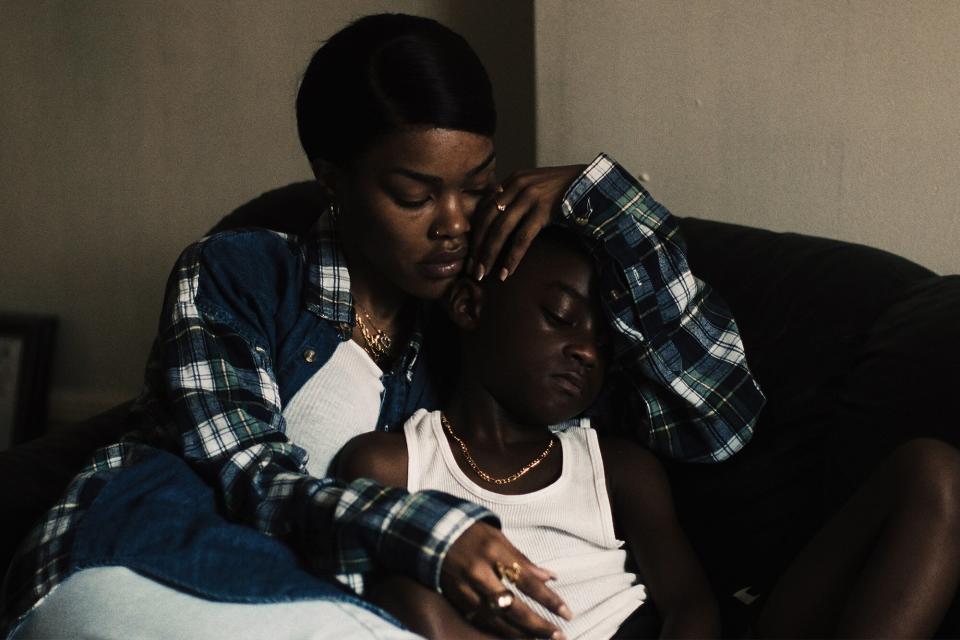
<em>Air</em>
2023 is the year for crisp, cool takes on corporate IP. (See: Blackberry, Tetris, Flamin' Hot.) But the flashiest (and the best) of them was Ben Affleck's Air, the first film from Affleck and Matt Damon's production company, Artists' Equity Studio. It follows Phil Knight (a delightfully gonzo Affleck), his company Nike, and employee Sonny Vaccaro (Damon) as they attempt to forge a business deal with Michael Jordan and develop the Air Jordan shoe line. Corporate business meetings and athletic shoe design hardly seem the stuff of scintillating drama, but as with so much of his work, Affleck leads with humanity, digging into the people behind Air Jordans and why that personal touch was essential to their success. Chris Messina steals scenes as unhinged, foul-mouthed agent David Falk, while Jason Bateman underlays his straight-man deadpan with subtle emotion as Rob Strasser. But much like Jordan on the court, Viola Davis is the GOAT as Jordan's steadfast mother, Deloris, who is determined to play hard ball for her son. In some ways Air is a thesis statement for Artists' Equity itself, a tautly written drama about upending traditional licensing deals in favor of a policy where athletes (and artists) get a piece of everything they touch. Air is a richly entertaining, nimbly paced ensemble piece, but it's also a passionate tribute to innovation and equity — something industry (entertainment and otherwise) could use a whole lot more of. —Maureen Lee Lenker
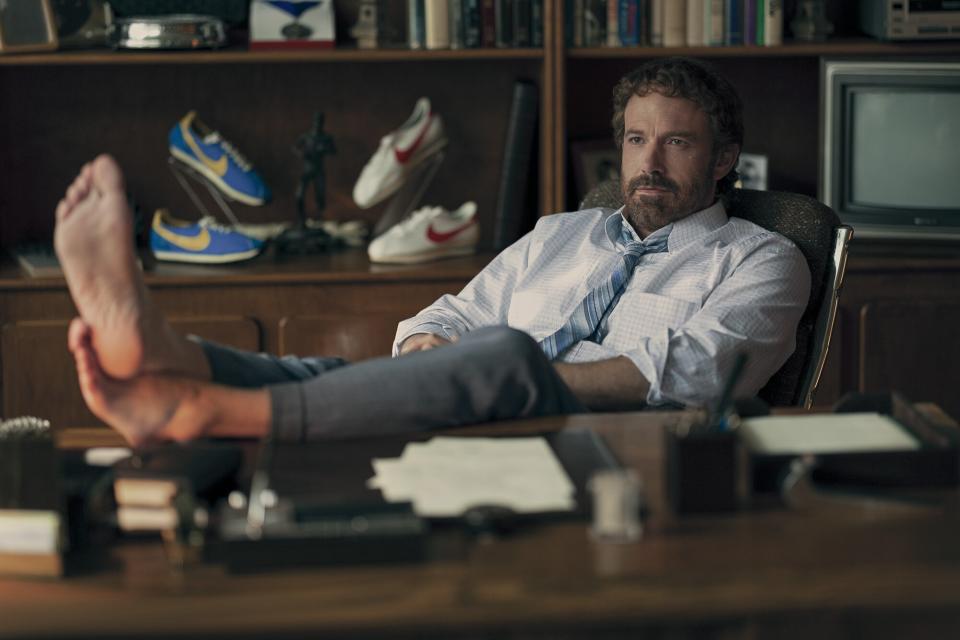
<em>Are You There God? It's Me, Margaret</em>
Quiet, but never precious, this adaptation of Judy Blume's beloved coming-of-age novel is everything fans of the book could have wished for and then some. (If you need proof, consider that Blume outright refused to sell the film rights for 50 years until writer-director Kelly Fremon Craig's insightful pitch came her way.) Abby Ryder Fortson leads the film as the titular Margaret, avoiding anything cloyingly precocious, opting instead for a relatable awkwardness that feeds her interactions with gal pals and cute boys alike. She's bolstered by an adult supporting cast including a luminous, yet harried Rachel McAdams as her mother, Barbara; Bennie Safdie as her nebbish, loving father, Herb; and Kathy Bates as Margaret's boisterous, affectionate grandmother. Craig, as has always been the case with Blume, never tries to talk down to her pre-teen audience or dismiss their intelligence. Instead, she meets them (and their parents) where they are with a poignant, funny, honest portrayal of puberty and growing up (understanding that for a tween buying a bra can be as traumatic as questioning one's faith). Margaret deserves a place in the coming-of-age movie hall of fame alongside the likes of Stand By Me and American Graffiti, particularly for the ways it treats girlhood with grace and gravitas, uplifting the fresh, relatability of Blume's voice. —ML
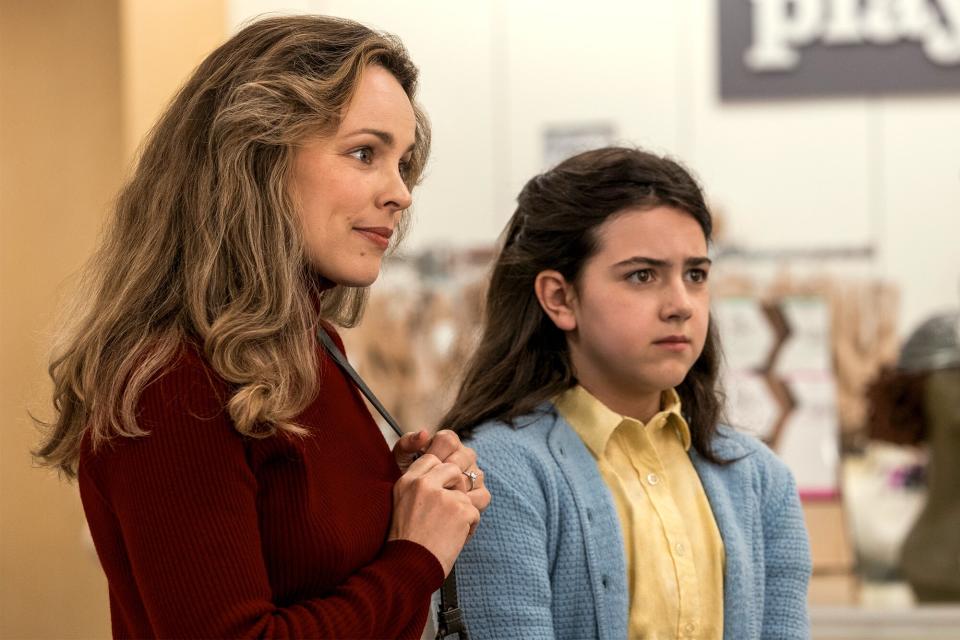
<em>Asteroid City</em>
Every time Wes Anderson makes a new movie, it feels like "the most Wes Anderson movie ever." That's because the director is constantly improving on his trademark mixture of intricately constructed fantasy worlds and deadpan dialogue delivery, and the powerful friction that results from the collision. Even more than The Grand Budapest Hotel or The French Dispatch, the nesting-doll structure of Asteroid City (which plays out as, essentially, a documentary about a play) can throw you for a loop upon first contact. But the deeper you go, the deep emotions about loss and changing times can strike with unexpected power. On the level of filmmaking, Anderson outdoes himself by riffing on genres as diverse as social realist Broadway theater and '50s Technicolor Westerns. The cast combines veterans of his movies (like Jason Schwartzman and Adrien Brody) with newcomers (like Tom Hanks and Steve Carell) and some of the most charming child actors you'll see on screen this year, all of whom get to put their own spin on Anderson's funniest dialogue yet. Sometimes Asteroid City goes black-and-white like the director's original Bottle Rocket short film, and in two truly transcendent scenes Anderson deploys the stop-motion animation he perfected on Fantastic Mr. Fox and Isle of Dogs. It really is the most Wes Anderson movie yet — of course it's one of the best this year has to offer. —CH
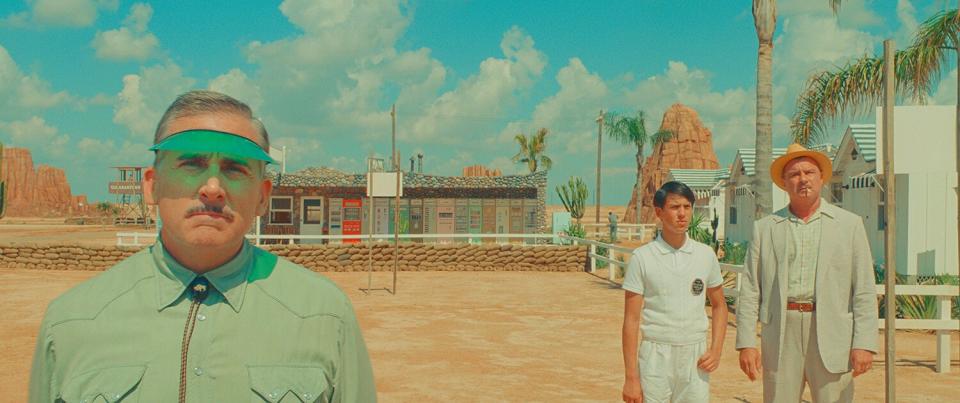
<em>John Wick: Chapter 4</em>
Several big-name film franchises came to an end this year, but no film finale was grander than this goodbye (for now…?) from Keanu Reeves' gunslinging hitman. All four John Wick films have been directed by Reeves' former stuntman Chad Stahelski, and that continuity paid off in a fourth installment stacked top-to-bottom with one grand, colorful fight scene after another — each of which outdoes anything in the original — all executed to precision by a team that knows exactly what they're doing at this point. The John Wick series has always borrowed heavily from Asian action cinema, and finally paid that marker by giving Donnie Yen and Hiroyuki Sanada meaty roles that let them kick ass. But the biggest surprise comes from musician Rina Sawayama, who manages to repeatedly steal the screen in her film debut — and bring a whole different energy to post-credits scenes. —CH

<em>M3GAN</em>
When AI finally conquers humanity, I'll welcome our new robot overlords with open arms — provided they're half as fun as M3GAN. In a year filled with self-serious reboots and unimaginative genre fare, this horror-comedy is pure schlocky joy, centering on an awkward tech employee (Allison Williams) and the companion robot she programs for her niece. The trailer alone was enough to turn M3GAN into a social media sensation, and the film itself is an unhinged delight, following the titular android as she chops up tech CEOs and TikTok dances her way into our hearts. The horror genre is littered with killer dolls, but M3GAN is truly one of a kind — a lean, mean, meme-worthy machine who's both hilarious and deeply unsettling. You'll never hear Sia's "Titanium" the same way again. —Devan Coggan

<em>Past Lives</em>
While IP-driven blockbusters continue to fixate on the multiverse, Celine Song's Past Lives spins the ideas of paths not taken and alternate lives they might've created into an actually relatable, heartbreaking human drama. Nora (Greta Lee) and Hae Sung (Teo Yoo) knew each other as kids in South Korea, but naturally grew apart after Nora's family emigrated to North America. Twelve years later, they reconnect over Facebook and Skype — and Song disproves the old truism that the internet is inherently un-cinematic by drawing real pathos out of shaky connections and televisual catch-up conversations. Twelve years later, they reunite again, and the longing is almost unbearable. (Lee and Yoo do justice to comparisons with In the Mood for Love.) Song is a playwright, but this movie is far from "stagey." There are nearly as many beautiful close-ups on puddles as there are on human faces — further proof that even the most romantic human stories are deeply formed by the geography that surrounds us. —CH

<em>Polite Society</em>
Like so many modern young people, Ria Khan (Priya Kansara) wants to be a superhero. But it's not like she's waiting around for a freak accident to give her special powers; instead, she practices fight techniques every day on her YouTube channel, honing her skills so that she can become a professional stuntwoman like her role model, Eunice Huthart — the kind of person who makes those big-screen Marvel movies possible in the first place. Ria soon gets the opportunity to put her fighting skills to the test when her beloved sister Lena (Ritu Arya) gets roped into a marriage whose beautiful trappings are just a cover for the sinister motives of her prospective mother-in-law (Nimra Bucha). In her feature film debut, director Nida Manzoor deploys the comedic timing and quick editing she sharpened on her Channel 4 sitcom We Are Lady Parts, and demonstrates once again the joy of seeing smart, funny women team up against the forces seeking to crush their dreams. —CH
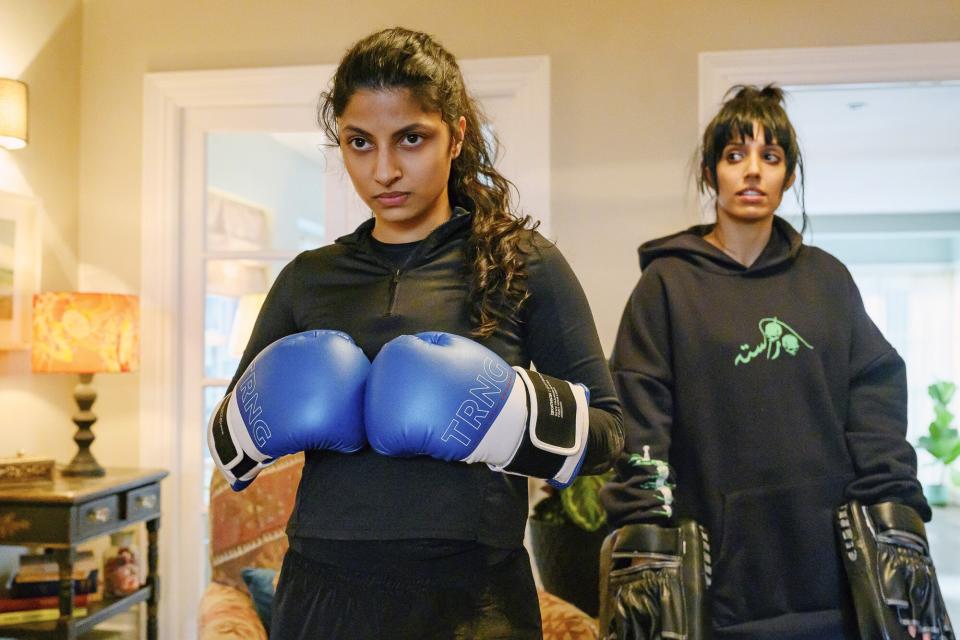
<em>Spider-Man: Across the Spider-Verse</em>
When the first Spider-Verse premiered in 2018, the multiverse was still a niche concept, familiar only to comic book nerds and theoretical physicists. Five years later, we're inundated with movies about the multiverse — and still, no one's doing it better than Spider-Verse. Expectations were high for the long-delayed sequel, and Across the Spider-Verse proved to be worth the wait, a colorful, jaw-dropping spectacle that pushes the boundaries of studio animation. Directors Joaquim Dos Santos, Kemp Powers, and Justin K. Thompson pack every frame with clever callbacks and giddy Easter eggs — but fan service is useless without a well-crafted story. (Cough cough, The Flash.) Spider-Verse expertly juggles both, following Miles Morales (Shameik Moore) as he struggles to balance his Spidey responsibilities with his loyalty to his family. In a sea of seemingly identical superhero movies, Across the Spider-Verse feels like the reset button we need. —DC
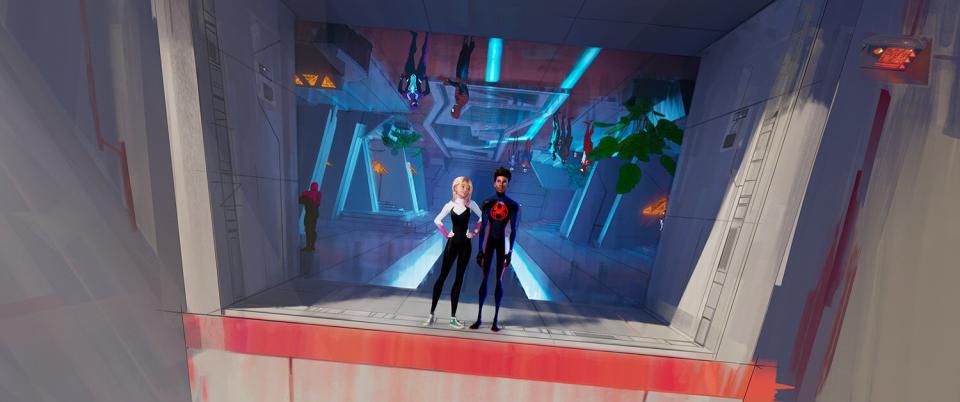
<em>Suzume</em>
Makoto Shinkai's Suzume feels representative of this year in animation, where beauty and innovation have come from unexpected corners. One of the most successful anime directors in Japan, Shinkai broke through with American audiences in 2016 thanks to his surprise hit Your Name, a lovely story of two teenagers who keep switching bodies. Suzume furthers the filmmaker's fascination with our weird bodies: Shortly after magic-wielding adventurer Souta recruits the titular heroine to help prevent cosmic incursions from "the Worm," he finds himself transformed into… a chair. Rest assured this is the most lively chair you've ever seen (watch it hurriedly hobble down the street in pursuit of the cat that cursed it!) thanks to a blend of 2D and 3D animation techniques, as well as a potent metaphor for the post-pandemic experience — don't we all feel a little frozen in place? Don't we all wish similar civilization-shaking disasters could be prevented by locking the right door? As with Shinkai's previous two films, the soundtrack for Suzume comes from the Japanese rock band Radwimps, and they help deepen the emotions behind the director's out-there ideas. —CH

Want more movie news? Sign up for Entertainment Weekly's free newsletter to get the latest trailers, celebrity interviews, film reviews, and more.
Related content:

